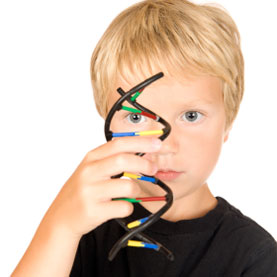 Teams of scientists working independently have for the first time identified several gene mutations that they agree sharply increase the chances that a child will develop autism. They have found further evidence that the risk increases with the age of the parents, particularly in fathers over age 35.
Teams of scientists working independently have for the first time identified several gene mutations that they agree sharply increase the chances that a child will develop autism. They have found further evidence that the risk increases with the age of the parents, particularly in fathers over age 35.
The gene mutations are extremely rare and together account for a tiny fraction of autism cases — in these studies, only a handful of children. Experts said the new research gave scientists something they had not had: a clear strategy for building some understanding of the disease’s biological basis.
Scientists have been debating the relative influence of inherited risk and environmental factors in autism for decades, and few today doubt that there is a strong genetic component.
But biologists have groped in vain for a reliable way to clarify the underlying genetics of these so-called autism spectrum disorders, including Asperger syndrome and related social difficulties that are being diagnosed at alarmingly high rates — on average, in one in 88 children, according to a government estimate released last week.
Previous studies have produced a scattering of gene findings but little consensus or confidence in how to proceed.
The new research — reported in three papers posted online on Wednesday in the journal Nature — provides some measure of both, some experts said. There are probably hundreds, perhaps more than a thousand, gene variations that could disrupt brain development enough to result in social delays.
An intensified search for rare mutations could turn up enough of these to account for 15 percent to 20 percent of all autism cases, some experts say, and allow researchers a chance to see patterns and some possible mechanisms to explain what goes awry.
